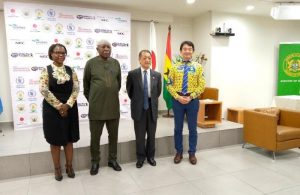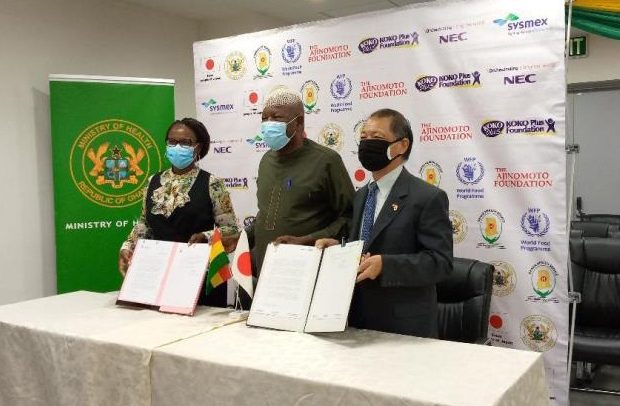The Government of Japan Thursday signed a Grant Agreement with the World Food Programme (WFP) in Accra to support Ghana’s nutrition improvement project with 4.5-million dollars.
The project, titled: “Project for Universal Nutrition and Health Coverage through Sustainable Systems for Nutrition Improvement,” seeks to improve nutrition, especially among the most vulnerable in deprived communities across the country.
It would be implemented by the WFP in 90 districts in eight regions: Greater Accra, Ashanti, Central, Bono East, Ahafo, Upper East, Western and Volta, and in one district in the Northern Region.
The documentation of the grant was signed for and exchanged between Tsutomu Himeno, the Ambassador of Japan, and Ms Anna Mukiibi-Bunnya, the WFP Representative Ad Interim and Officer-in-Charge.
Ms Mukiibi-Bunnya commended the Government and People of Japan for the consistent funding of the WFP activities in Ghana to improve the country’s nutritional status, especially among the most vulnerable.
“Thanks to your generosity, programmes have been implemented to explore local food-based approaches to nutrition and to reduce stunting and micronutrient deficiencies using good quality locally produced specialised nutritious foods, protein and micronutrient powder, and Social and Behaviour Change Communication (SBCC)”.
She said the previous project implemented by the Ghana Health Service, the WFP, and the Ajinomoto and KOKO Plus foundations, which used a combination of SBCC in food assistance and market-based approaches, significant improvement in nutrition and haemoglobin levels was recorded in rural and peri-urban areas in the Northern and Ashanti regions.
Ms Mukiibi-Bunnya said the results gave the impetus to embark on another initiative, this time among six partners involving the Ministry of Health, GHS, WFP, the Ajinomoto Foundation/KOKO Plus Foundation, NEC Corporation and Sysmex Corporation.
She said through this new project, quality nutrition and health services would be made accessible to over 250,000 people by marketing and providing nutritious foods and micronutrient supplements, livelihood initiatives, innovative diagnostic services and SBCC.
Ms Mukiibi-Bunnya said 7,500 vulnerable pregnant and nursing mothers, children and adolescent girls, would also be supported to access nutritious foods through a voucher scheme.
She said a livelihood component had also been included in the new project to help improve and sustain the economic and nutritional status of beneficiaries even at the end of the project.
The pivot of the new nutrition project was SBCC, which was critical to informing, educating, and changing habits, hence over 200,000 people would receive nutrition education and counselling and get the opportunity to buy KOKO Plus to boost child growth and development, she said.
Ms Mukiibi-Bunnya said as Ghana aspired to improve its middle-income and developmental status, more of such PPP initiatives would become necessary as it was impossible for governments alone to achieve the Sustainable Development Goals and called for strengthened collaboration with development partners, private sector, academia and the media for holistic development.
Mr Himeno, on his part, said the Government of Japan considered health and nutrition as vital elements that enhanced human security and safeguarded dignity, to which it gave much focus, and applauded the implementers of the previous project for the success, leading to the new initiative.
Alhaji Asei Mahama Seini, a Deputy Minister of Health, thanked the Japanese Government for its sustained support to Ghana in diverse ways including the development of the Maternal and Child Health Record Book and nutrition services.
He pledged the support of the Ministry to ensure the success of the new project.

GNA


